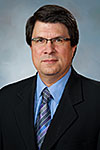UHV partners with VC to offer new humanities concentrations
Students wanting to pursue careers in art, music or drama will be able to follow their dreams starting this fall thanks to a partnership between the University of Houston-Victoria and Victoria College.
UHV will offer three new concentrations – art, music and theater – in the Bachelor of Arts in humanities. Many of the courses for these concentrations will be offered through VC. The students will be enrolled at UHV.
“Victoria College has some excellent facilities and talented faculty members,” said Andrew Baerg, a UHV associate professor of communications and chair of the UHV School of Arts & Sciences Humanities and Arts Division. “This is an opportunity for our institutions to better serve students while also helping each other grow.”
The idea to partner and create more arts programs came up during a meeting between VC and UHV in January, Baerg said. VC already has arts and performance facilities, and UHV offers art courses in the UHV Center for the Arts, 204 N. Main St.
“The Victoria community shows an immense appreciation for the arts, and UHV and VC are excited to come together and offer these concentrations,” said Jeffrey Di Leo, dean of the UHV School of Arts & Sciences. “Through this partnership, our institutions will be able to meet the needs of students interested in pursuing the arts while also finding more ways to connect with our community.”
The programs will begin with lower-level courses in each of the concentrations. More courses will be added as the concentrations grow and develop, said Jonathan Anderson, a VC music professor and Fine Arts Department chair.
“This partnership is an exciting opportunity for both institutions to explore something new,” Anderson said. “There’s a lot to explore, and any effort to start something new means there will be successes and things that need to be reexamined. I’m looking forward to seeing how these concentrations will take shape.”
The art concentration will include courses taught by Cynthia Miller, UHV artist in residence, and ceramics courses taught at Victoria College. The music program will offer instruction in both vocal and instrumental music, and students will have the opportunity to participate in ensembles. The theater program currently is oriented around acting and introductory theater, and there likely will be plays presented by the students in the future, Baerg said.
“There’s a lot of room to grow as we develop each of these concentrations,” Baerg said. “As UHV and VC collaborate, our ultimate goal is always to ensure that we meet the needs of and benefit the students.”
The focus on helping and improving students’ experiences is one both institutions share, Anderson said. That is especially true when looking for ways to keep students in Victoria as they further their studies rather than seeing them go to Austin, San Antonio or other large cities.
“Victoria College is happy to be in a position to collaborate with UHV and create more opportunities for students to stay in Victoria,” Anderson said. “This is an awesome opportunity, and I am optimistic about all the new directions and options these concentrations will present.”
To learn more about the concentrations, contact the UHV School of Arts & Sciences at 361-570-4201 or artssciences@uhv.edu.
The University of Houston-Victoria, located in the heart of the Coastal Bend region since 1973 in Victoria, Texas, offers courses leading to more than 80 academic programs in the schools of Arts & Sciences; Business Administration; and Education, Health Professions & Human Development. UHV provides face-to-face classes at its Victoria campus, as well as an instructional site in Katy, Texas, and online classes that students can take from anywhere. UHV supports the American Association of State Colleges and Universities Opportunities for All initiative to increase awareness about state colleges and universities and the important role they have in providing a high-quality and accessible education to an increasingly diverse student population, as well as contributing to regional and state economic development.
Lauren Hightower-Emerson
361-570-4342







